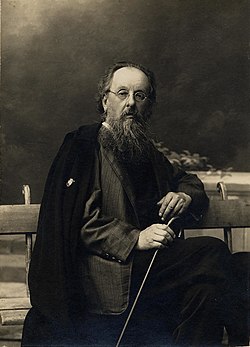Konstantin Tsiolkovsky | |
|---|---|
| Константин Циолковский | |
 Tsiolkovsky in 1924 | |
| Born | 17 September [O.S. 5 September] 1857 Izhevskoye, Ryazan Governorate, Russian Empire |
| Died | 19 September 1935 (aged 78) Kaluga, Soviet Union |
| Known for | Tsiolkovsky's rocket equation |
| Scientific career | |
| Fields | Astronautic theory |
| Signature | |
 | |
| Part of a series of articles on the |
| Soviet space program |
|---|
Konstantin Eduardovich Tsiolkovsky (Russian: Константин Эдуардович Циолковский, IPA: [kənstɐnʲˈtʲin ɪdʊˈardəvʲɪtɕ tsɨɐlˈkofskʲɪj] ; 17 September [O.S. 5 September] 1857 – 19 September 1935)[1] was a Russian rocket scientist who pioneered astronautics. Along with Hermann Oberth and Robert H. Goddard, he is one of the pioneers of space flight and the founding father of modern rocketry and astronautics.[2][3][4] His works later inspired Wernher von Braun and leading Soviet rocket engineers Sergei Korolev and Valentin Glushko, who contributed to the success of the Soviet space program.
Tsiolkovsky spent most of his life in a log house on the outskirts of Kaluga, about 200 km (120 mi) southwest of Moscow. A recluse by nature, his unusual habits made him seem bizarre to his fellow townsfolk.[5]
- ^ Mikhail S. Arlazorov, Konstantin Tsiolkovsky at the Encyclopædia Britannica
- ^ "International Space Hall of Fame: New Mexico Museum of Space History: Inductee Profile". www.nmspacemuseum.org. Retrieved 10 August 2017.
- ^ "Konstantin E. Tsiolkovsky". Aeronautics Learning Laboratory for Science Technology, and Research (ALLSTAR) Network. 12 March 2004. Archived from the original on 28 October 2015. Retrieved 10 June 2015.
- ^ Emme, Eugene (1966). "Part I: Early History Of The Space Age". Aerospace Historian. 2 (13): 77. JSTOR 44524448. Retrieved 6 January 2024.
- ^ Lewis, Cathleen Susan. 2008. The Red Stuff: A History of the Public and Material Culture of Early Human Spaceflight in the U.S.S.R. Ann Arbor, MI: ProQuest LLC. pp. 57–59. ISBN 9780549466796.